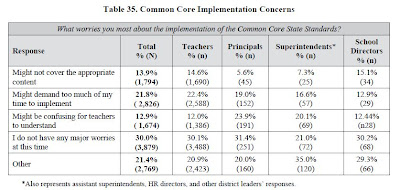On the TPEP web page, I found a link to the Institutes's fifty-nine page report. The findings are based on an invitation in the fall of 2012 to teachers, principals, superintendents, and school directors to complete a brief survey about their district’s educator evaluation system and Common Core State Standards implementation. A total of 15,793 (26.2 percent) of the 60,251 possible K–12 educators in the state completed the survey.
Though I haven't had a chance to review in detail, two things jumped out at me, one in the common core and one in the evaluation findings. The first is shown below by the response from the participants that, given current structures, finding the time to implement the new evaluation model is the most common concern. This would be consistent from what we are learning from our principals and those teachers that have been involved in training thus far. What I find interesting is the large percentage of principals and superintendents who do not see this as the major concern. Though I have many other areas of concern such as rater reliability, in our current reality time may be the most difficult barrier to overcome for many of our building administrators
Related to the Common Core implementation is this finding where at least 30% of teachers, principals, and school directors do not have any major worries at the time of the survey. I wonder if that result is driven by a lack of knowledge and understanding of the instructional practice and assessment requirements embedded in the shift to the Common Core. I also need to check what "Other" worries were identified by 35% of the superintendents who responded.
 |
| www.fireup.net |
Provide opportunities and resources for districts to learn from the TPEP pilot districts.
Provide strategic support around communication plans, and assist districts in selecting appropriate instructional and leadership frameworks.
Provide coordinated support and resources to districts to assist them in their efforts to provide district wide training for their teachers and principals on their new evaluation systems.
Provide specific help to districts in their efforts to develop a clear message about how they will address educator concerns around time concerns, feasibility of implementation, fairness, and training needs.





No comments:
Post a Comment